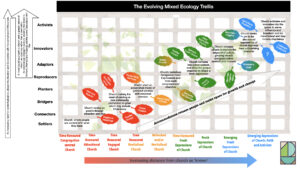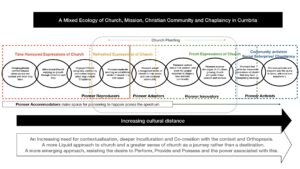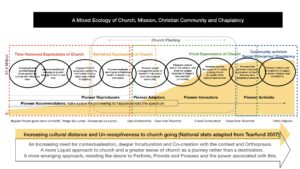Following on from the post on Hopium which seemed to get a lot of traction I wanted to revisit and update the series of posts I did on rethinking church nearly 20 years ago as so much of theology has shifted.
The church, as we have inherited it, is a curious organism. We gather, we sing, we listen, we disperse. But beneath the surface, a tension still simmers when not masked hopeium. A innate sense that the forms and definitions we cling to are no longer fit for the world we inhabit. As I wrote years ago, western Christianity’s subcultural weakness is not simply a matter of style, but of substance—a deep-rooted commitment to evolutionary tweaks, wrapped up in the idea of progress and an unconscious bias shaped by capitalism. So revolutionary re-imaginings are not given the space needed for real change. We are, perhaps, rearranging the furniture in a house whose foundations are already crumbling.
We have mistaken the kingdom for the church, and in doing so, we have shrunk the wild, inclusive, boundary-breaking movement of Jesus into something manageable, measurable, and ultimately, exclusive. The “mustard seed” has grown, yes, but what has taken root in its branches is not always shelter for the world’s birds, but often a haven for scavengers. The vultures of our own dualisms, our own need for security, our own reluctance to let go of the white make sky god reside in our branches and we welcome them both knowingly and unknowingly.
Our inherited dualisms—sacred/secular, worship/life, activity/being—have split us down the middle. We “worship” in buildings, but not in workplaces or wild places. We “pray” at set times, but not in the ongoing, messy encounters of everyday life. The emerging church, for all its creativity, often risks being a new style in an old paradigm—mission-flavoured rather than mission-shaped, to borrow George Lings’ phrase.
What if, instead, we took seriously the call to a holistic, post-dualist faith? What if, as eco-theologians remind us, the whole earth is full of God’s glory—not just our sanctuaries, but the soil, the rivers, the market stalls, the digital commons? What if, as Donna Haraway suggests, we are and always were already entangled—human and non-human, sacred and profane, church and world—in a web of becoming-with?
Let’s risk a new definition: Church is not an event, nor a building, nor a set of beliefs. It is a way of being and living—a series of chaotic but intentional encounters with God, with one another, and with the world. It is a porous, processual, ever-unfinished community, founded on the holistic teaching (and wild example) of Christ.
This kind of church is less about “services” and more about service; less about “worship” as a genre, more about worship as a posture of life. It is a community where everyone’s gifts—however secular or sacred they may seem—are welcomed, reflected upon, and woven into the shared story. It is a space where buying a fairtrade banana, tending a garden, or protesting for climate justice can be as much worship as singing a hymn, if done in love and for the flourishing of the other.
Donna Haraway’s call to “stay with the trouble” is deeply resonant here. Church is not about escaping the world’s mess, but about inhabiting it more deeply, more compassionately, more creatively. We are, as Haraway puts it, “companion species”—not just with each other, but with the more-than-human world. Church, then, is an entangled, ecological community: a place where we learn to be human together, in kinship with all creation.
Eco-theology reminds us that the redemption of all things is not a distant hope, but a present calling. The church is not a bunker against the world, but a compost heap—messy, generative, full of potential for new life. Our worship is not just liturgy, but liturgy lived: in acts of justice, care for the earth, radical hospitality, and the ongoing work of reconciliation.
So what might this look like in practice? Imagine a group of people—some committed, some curious—gathering, walking, sharing meals, tending gardens, reflecting together, acting together, welcoming the stranger, making space for lament and joy. Leadership is facilitative, not hierarchical. The process is open-ended, responsive to the Spirit, and always in conversation with the wider world. An invitation not a blueprint. As with all living things, church must be allowed to grow, adapt, and sometimes die, so that new life can emerge. We need the courage not to simply shift to new wineskins but a paradigm shift to wine bottles, such is the change demanded by the context 20 years on from when I first wrote.
We are living in a time of ecological crisis, social fragmentation, and spiritual longing. The old paradigms are failing us, and the world is groaning for communities of hope, justice, and deep belonging. The church, if it is to have a future, must be re-formed—not just in style, but in substance; not just in structure, but in spirit. (I’ll write some more on this after reflecting on Alasdair Macintyres death and revisiting his approach to virtue ethics)
But for now Let us, stay with the trouble. Let us risk the chaos of true community. Let us become, together, the community the world needs—entangled, embodied, and ever unfinished.



